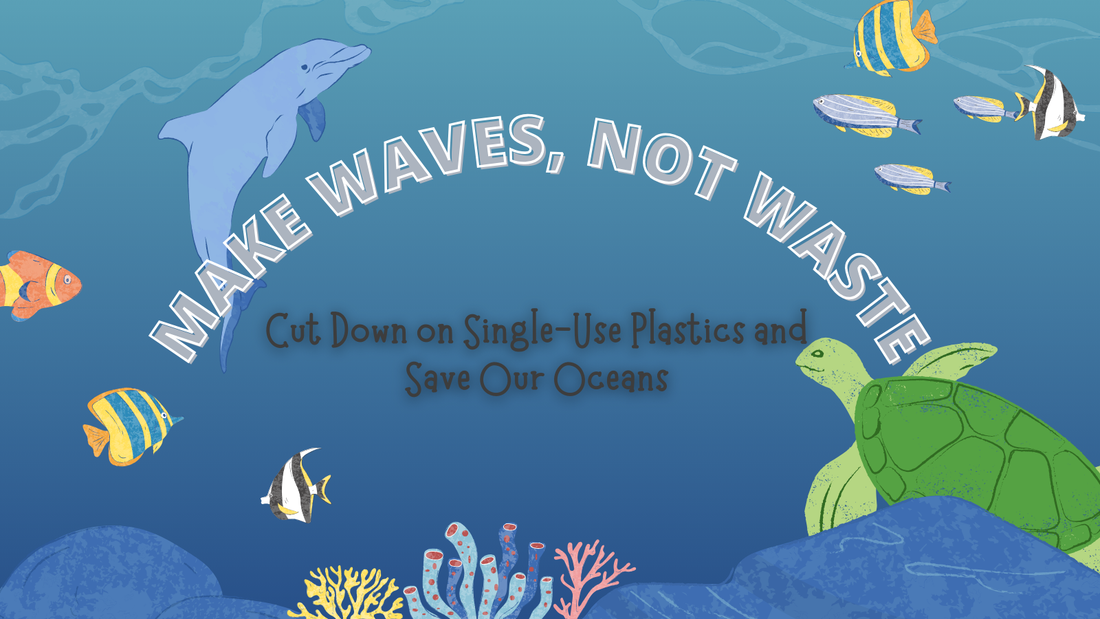
Make Waves, Not Waste: Cut Down on Single-Use Plastics and Save Our Oceans
Single-use plastics are making waves—and not the good kind. These convenient but incredibly harmful materials are flooding our oceans, wreaking havoc on marine life, and messing with delicate ecosystems. Picture sea turtles choking on plastic bags and seabirds with stomachs full of plastic debris. The damage is real and widespread, but don't worry—you can be part of the solution! Let's dive into some game-changing hacks and practical tips to help you cut down on single-use plastics and protect our beautiful oceans.

Carry Reusable Bags Everywhere
Carrying reusable bags everywhere is a game-changer. Not only are they sturdier than plastic, but they also slash the mountains of plastic bags that end up in our oceans and landfills.
Invest in Refillable Bottles
Want to make a bigger splash? Invest in a sleek, reusable water bottle. Say goodbye to single-use plastic bottles and hello to a huge difference in reducing ocean plastic pollution.
Shop at Bulk Stores
Shopping at bulk stores is another savvy move. By purchasing non-perishable items in bulk, you can drastically cut down on plastic packaging. Bring your own containers and skip the plastic-wrapped products altogether.
Choose Plastic-Free Packaging
When you're out shopping, be on the lookout for plastic-free packaging. Opt for products with minimal or eco-friendly packaging, like glass, paper, or metal over plastic.
Bring Your Own Coffee Cup
If you're a coffee lover, bring your own coffee cup or tumbler. Many cafes even offer discounts for BYOC (bring your own cup), and you'll be cutting down on those pesky disposable plastic lids and sleeves.
Avoid Plastic Cutlery
On the go? Ditch the plastic cutlery and pack a reusable set instead. Plastic utensils are a major contributor to ocean pollution, but they can easily be swapped for a durable, eco-friendly alternative.
Say No to Plastic Straws
And let's not forget about straws—say no to plastic straws and choose reusable ones made from metal, bamboo, or silicone.

Recycle Responsibly
Recycling responsibly is also a must. Follow local recycling guidelines to ensure plastics are properly sorted and processed. Effective recycling reduces the amount of plastic waste that ends up in the ocean.
Educate Yourself and Support Legislation
Stay updated on the environmental impact of single-use plastics and learn about sustainable alternatives. Advocate for laws and regulations that aim to reduce single-use plastics and promote sustainability. Your voice can help drive change at the local and national levels.
Opt for Eco-Friendly Alternatives
When a single-use item is necessary, opt for eco-friendly alternatives like biodegradable or compostable options. These are better for the environment and decompose more quickly.

Spread Awareness
Share your knowledge about the impacts of single-use plastics with friends and family. The more people are aware, the more likely they are to make changes.
Avoid relying on convenience, which often comes with environmental costs. Make the extra effort to use reusable or eco-friendly options instead of grabbing plastic items. Be mindful of every piece of plastic you use and try to minimize it as much as possible. Pay attention to packaging when shopping and opt for products with minimal or no plastic packaging to reduce waste. Participate in or organize beach clean-ups to help remove plastic waste from our shores and raise awareness about the issue. Don't get discouraged—making a difference can be challenging, but every step counts. Stay committed to reducing your plastic use and encourage others to do the same.
The impact of single-use plastics on our oceans is profound. Marine life is threatened as sea creatures often mistake plastic for food, leading to ingestion, choking, or entanglement, causing serious injury or death. Plastics disrupt marine ecosystems, affecting everything from coral reefs to small marine organisms, leading to imbalances that impact the entire oceanic food chain. As plastics break down, they form microplastics that contaminate the water and are ingested by marine life, leading to health issues and further pollution. Plastics release harmful chemicals into the water, which can be toxic to both marine life and humans, accumulating in the food chain. The aesthetic value of oceans and beaches decreases due to plastic pollution, impacting tourism and recreational activities and diminishing the enjoyment of coastal environments. The economic burden of cleaning up plastic waste from beaches and oceans is enormous, impacting local economies and resources. Algal blooms fueled by plastic pollution can reduce oxygen levels in the water, creating “dead zones” where marine life struggles to survive. Plastic pollution affects fish populations, which can have economic consequences for communities that rely on fishing for their livelihoods. Plastics washed ashore can contaminate coastal soils, affecting plant life and broader coastal ecosystems. Finally, plastics take hundreds of years to decompose, meaning their environmental impact is long-lasting and far-reaching.
Reducing single-use plastics is essential for safeguarding our oceans and marine life. By adopting these eco-friendly practices, you can help cut down on plastic pollution and make a positive impact on the environment. Ready to take action? Let’s work together to keep our oceans clean and vibrant!
Got your own tips for reducing single-use plastics? Share them with us and join the movement for cleaner seas!

